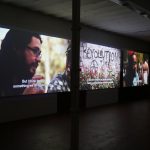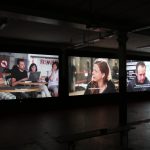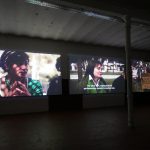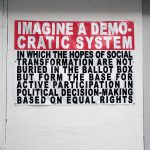“La Fabbrica del Cioccolato” foundation
Thursday 04th August 2016 | at 6pm | Blenio Valley | Canton Ticino – Switzerland
Opening of the exhibition Confronting Comfort’s Continent
with Oliver Ressler
The starting point of the exhibition “Confronting Comfort’s Continent”* is the base of the foundation La Fabbrica del Cioccolato: a former factory.
The discussion that ensues is about factories under workers’ control, where not only goods but also new social and economic models are “produced”.
The 3-channel video installation “Occupy, Resist, Produce” (2014/2015; with Dario Azzellini) focuses on three factories in Milan, Rome and Thessaloniki, where the purpose of factory occupations was to bring production under workers’ control. The workers take the initiative and become protagonists, building horizontal social relations on the production sites and adopting mechanisms of direct democracy and collective decision-making. The recuperated workplaces often reinvent themselves, building links with local communities and social movements.
Millions of people were inspired by the attempt to produce new social models in the reclaiming of public space associated with the movements of the squares and the Occupy movement of 2011/2012. These non-hierarchical movements rejected representation: as in the recuperated factories, the activity was shaped by direct democracy. The occupation of public places served as a catalyst for demonstrations, broad-based strikes, meetings and working groups on urgent questions of all kinds.
“Take The Square” (2012) is based on discussions with activists from 15M in Madrid, the Syntagma Square movement in Athens and Occupy Wall Street in New York. The discussions cover issues of organization, horizontal decision-making processes, the importance and function of occupying public spaces and how social change can occur.
The exhibition of these two large 3-channel video installations is extended on another floor of La Fabbrica del Cioccolato, where four films are presented in dialog with digital prints and light boxes.
“The Visible and The Invisible” (2014) and “The Right of Passage” (with Zanny Begg, 2013) are two films taking different approaches to cross-border movement, access (denied) and systematic plunder.
The first looks at Switzerland’s role as global headquarters for barely visible transnational corporations trading in raw materials (“commodities”) extracted primarily from the southern hemisphere. “The Right of Passage” focuses on struggles to obtain citizenship while also questioning the inherently exclusive nature of citizenship. Interviews with Sandro Mezzadra, Antonio Negri and Ariella Azoulay open a discussion with a group of people living “without papers” in Barcelona. This discussion on borders is continued in Oliver Ressler’s most recent film “Emergency Turned Upside-Down” (2016). This film confronts the cynical and inhuman discourse that calls refugees’ presence in Europe “emergency” when that word should be applied to the war, terror and economic strangulation that forced people to move.
The film is set within the tension that runs through social life right now: on one hand the vast imaginative potential of a borderless world, and on the other the petty prison of nationality and all the external, internal and social borders it entails.
“Leave It in the Ground” (2013) extends to a global context the ecological perspective already present in “Occupy, Resist, Produce”, addressing the inflammatory effects of global warming on existing social conflicts. In the Global South, climate change aggravates crises of poverty, violence and unrest which – along with global warming itself – are legacies of colonialism and norms of neoliberal capitalism. This vicious circle fuels humanitarian crises and civil wars that amplify political, economic and environmental disasters. The film suggests that ecological and humanitarian disasters caused by global warming may topple old orders and open up possibilities of long-term social and political transformation, both positive and negative.
The main idea of the exhibition “Confronting Comfort’s Continent” is to transform a (former) factory into a site for the production of knowledge and discussion of new social and economic models able to outrun the deadening capitalist realism on offer.
* The title “Confronting Comfort’s Continent” is modified from the narration (co-written with Matthew Hyland) of the film “Emergency Turned Upside-Down”, where it refers to Europe in particular. But as a title it refers less to a geographical continent than to a kind of managed obliviousness to crisis, a condition sold as “comfort” by managers who find fewer willing buyers for it every day.
On Friday 2nd September 2016 at 6pm a conference will take place about the exhibition’s themes and projects with: Federica Martini, Gerald Raunig, Noah Stolz and Oliver Ressler. Federica Martini, art historian and curator, worked at the contemporary art museum Castello di Rivoli in Turin and she works as curator at Museum of Post Digital Cultures. Gerald Raunig is a philosopher and art theorist; he teaches at the university of at the Zürich University of the Arts, and the EIPCP in Vienna and he is the author of Art and Revolution: Transversal Activism in the Long Twentieth Century (2007). Noah Stolz is the first director of La Rada, a space for contemporary art based in Locarno (CH), besides working as a freelance curator and art critic.
Oliver Ressler, born 1970, lives and works in Vienna and produces installations, projects in public space, and films on issues such as economics, democracy, global warming, forms of resistance and social alternatives. Oliver Ressler has had solo exhibitions in major art spaces such as Berkeley Art Museum, USA; Platform Garanti Contemporary Art Center, Istanbul; Museum of Contemporary Art, Belgrade; Centro Cultural Conde Duque, Madrid; Alexandria Contemporary Arts Forum, Egypt; The Cube Project Space, Taipei; Wyspa Institute of Art, Gdansk, Lentos Kunstmuseum, Linz; and Centro Andaluz de Arte Contemporaneo – CAAC, Seville. Ressler has participated in more than 250 group exhibitions, including Museo Reina Sofía,
Madrid; SALT Beyoğlu, Istanbul; Yerba Buena Center for the Arts, San Francisco; Van Abbe Museum, Eindhoven; MASSMoCA, North Adams, USA and at the biennials in Prague (2005), Seville (2006), Moscow (2007), Taipei (2008), Lyon (2009), Gyumri (2012), Venice (2013), Athens (2013, 2015), and Quebec (2014). He is the director of 23 films. A retrospective of his films took place at Centre d’Art Contemporain Genève in 2013. For the Taipei Biennale 2008, Ressler curated A World Where Many Worlds Fit. A traveling show on the financial crisis, It’s the Political Economy, Stupid, co-curated with Gregory Sholette, has been presented at nine venues since 2011. In collaboration with Ines Doujak he co-curated Utopian Pulse – Flares in the Darkroom at Secession in Vienna in 2014. He received the 1st Prix Thun for Art and Ethics Award in 2016.
The chocolate factory Cima Norma used to be the heart of industrial development of Blenio Valley, thanks to its growing activity from the beginning of XX century until 1968, when it closed; the factory was then used for different purposes. La Fabbrica del Cioccolato foundation is now in charge of managing the cultural activities to be held in the factory. Foreignness programme started in 2016; it is a cultural project created by the artistic director Franco Marinotti as an analysis of the interaction between art and the territory, meant as evolving cultural, social and political heritage.
The term Foreignness involves different ways of feeling stranger, different, not belonging to a particular, changing context.
La Fabbrica del Cioccolato foundation has the following sponsors and technical sponsors: Banca dello Stato del Canton Ticino, Winteler, Cham Paper Goup, Dazzi Tipografia SA; institutional sponsors: Ente Regionale per lo Sviluppo Bellinzonese e Valli, Comune di Blenio, Organizzazione Turistica Regionale Bellinzonese e Alto Ticino, Comune Acquarossa, Comune di Serravalle; Media partners: Plug-in contemporary art and culture, Ticino Finanza and Metalocus.
Ongoing events at La Fabbrica del Cioccolato: Paper Building, by Daniel González, on Cima Norma main building’s façade, and CacaoCollective, by Ivo Rovira e Ana Ponce, open from Wednesday to Saturday, from14:00 to 19:00. Please always contact Mr. Franco Marinotti (f.marinotti@chocfact.ch +41 79 794 00 16) or Mr. Giovanni Casella (giocas@bluewin.ch +41 79 396 05 68).
The programme includes Il Pardo in Fabbrica – second edition: carte blanche to Carlo Chatrian with a selection from the programme of 2016 Locarno Film Festival; the Spanish artist Juan Lopez and the Swiss artist Fabrizio Giannini (October); the Israeli multimedia artist and composer Yuval Avital.
All information about ongoing and scheduled event are available on the website www.lafabbricadelcioccolato.org
The exhibitions at Cima Norma are open from Wednesday to Saturday, from14:00 to 19:00. Please always contact Mr. Franco Marinotti (f.marinotti@chocfact.ch +41 79 794 00 16) or Mr. Giovanni Casella (giocas@bluewin.ch +41 79 396 05 68).
General information:
“La Fabbrica del Cioccolato” foundation
What: Confronting Comfort’s Continent – Foreignness project
When: Thursday 4th August 2016 at 6pm
Artists: Oliver Ressler
Foreignness artistic director: Franco Marinotti
Duration: 4th August – 10th October 2016
Free entrance Wednesday to Saturday, from 2mp to 7pm or by appointment (info@lafabbricadelcioccolato.org) Please always contact Mr. Franco Marinotti (f.marinotti@chocfact.ch +41 79 794 00 16) or Mr. Giovanni Casella (giocas@bluewin.ch +41 79 396 05 68).
Information: info@lafabbricadelcioccolato.org www.lafabbricadelcioccolato.org
Address: Stabili Cima Norma | Strada Vecchia 100 | CH-6717 Torre-Blenio
Opening of Confronting Comfort’s Continent, Thursday 04th August 2016 (Courtesy of the artist Oliver Ressler):





